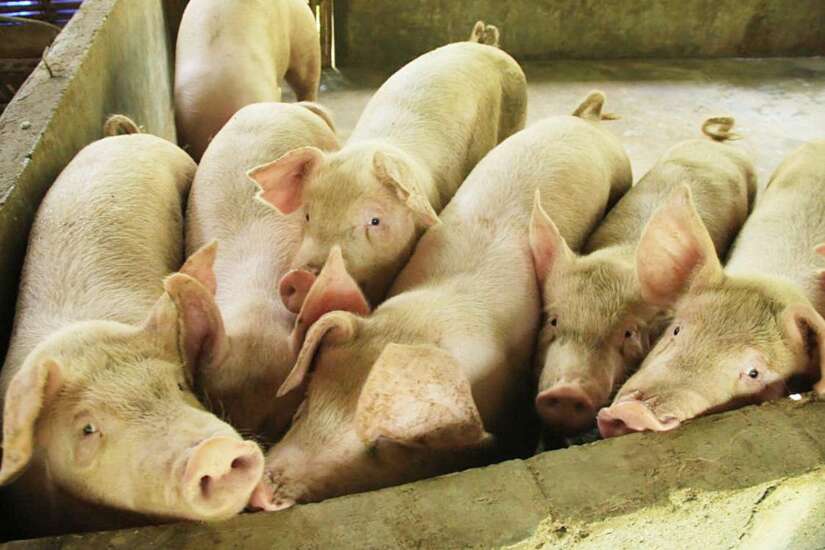Following reported case in Visayas
MORE stringent border measures are being implemented in all ports of Region 7 in view of the reported case of African Swine Fever (ASF) in the Visayas.
The Department of Agriculture Region 7 said the measure was prompted following reports of alleged high mortalities among swines in Abuyog, Leyte since the first week of January.
In a recent virtual meeting convened by the DA 7 Central Visayas Animal Disease Surveillance Advisory Committee (CV ADSAC), chief veterinarians in all four provinces and other city veterinarians together with the Regional Vet Quarantine Services 7 (RVQS-7) and Director Eduardo Oblena of the National Meat Inspection Services – Region 7 (NMIS-7) have agreed to strictly implement the stringent border measures and call for public vigilance to prevent the entry of ASF in the region.
Oblena said personnel of the LGUs and the RVQS-7 deployed in ports were ordered to strictly check all documents accompanying transported swine (including pork) and ensure that all livestock transport vehicles are properly disinfected (disinfection certificates must be present at all ports).
The RVQS-7, on the other hand, is now implementing the online application for shipping permits with an additional requirement for submission of a route plan.
Meanwhile, on Nov. 26, 2020, the Bohol LGU issued Executive Order (EO) 56 s2020 regulating transport and movement of pigs.
It is now implementing regulation where trucks containing pigs are unloaded / loaded only in designated areas within their ports.
The Province of Cebu, on the other hand, will soon release a new EO regarding establishment of quarantine regulations on the entry of livestock transport vehicles and vessels into Cebu. The veterinarians have further discussed the designation of specific ports in the region for entry/exit for trucks from Luzon and other regions affected by ASF.
The group also agreed to the conduct of random blood sample collections on slaughterhouses for negative surveillance. The laboratory tests will be conducted at the Regional Animal Disease Diagnostic Laboratory-7 (RADDL-7).
To ensure the protection of the region against entry of the ASF virus, all stakeholders and the general public are advised to avoid feeding pigs with swill; avoid the purchase of processed pork products coming from areas affected with ASF; implement biosecurity measures in all swine farms (backyard or commercial) and ensure that traders and animal feed deliveries must properly disinfect their transport vehicles.
Oblena called on the stakeholders to report immediately the unexplained mortalities in pigs to the local veterinary office or municipal agriculture offices.
“We urge everyone to be vigilant in maintaining CV ASF-free,” Oblena said.
This developed after Department of Agriculture (DA) announced on Friday night that blood samples taken from hogs in Abuyog, Leyte have tested positive for ASF.
In a press statement, DA 8 (Eastern Visayas) head Angel Enriquez said the region’s first case was detected in backyard farms in the villages of Can-aporong and Bunga where unusual swine mortality was reported late last year.
Enriquez said Leyte’s provincial veterinary office has launched an investigation and collected samples on January 6.
Four out of seven samples submitted to the Regional Animal Disease Diagnostic Laboratory yielded positive results in the antigen detection rapid test.
The positive samples were sent to the Animal Disease Diagnosis and Reference Laboratory of the DA’s Bureau of Animal Industry (BAI) in Manila for confirmatory testing, with the same result released on January 12.
“It was agreed during our coordination meeting with the local government unit (LGU) to immediately implement control measures, such as depopulation and proper disposal of the affected hogs, inventory of hogs in the identified areas, enforcement of strict border control, and disease surveillance and samplings, including nearby villages,” she said.
Veterinary quarantine checkpoints manned by personnel of the BAI, Leyte’s provincial agriculture and veterinary offices, the Philippine National Police, and the LGU have been set up in the town’s three highway borders, Enriquez added.
Abuyog Mayor Lemuel Gin Traya said as part of their containment measures, no hogs would be allowed entry and exit until February 14.
“They should be strictly confined in their respective barangays (villages) where they are being raised for private or commercial use,” Traya said in a Facebook post.
He added that all hogs “within the 500-meter radius from an infected swine as a point of reference, will be culled.”
Meanwhile, the DA-8 urged the public to immediately report unusual swine mortality and contact the DA-BAI at 0920-854-3119or the regional ASF coordinator at 0915-184-1883.
Pigs affected by ASF usually manifest high fever, distinct reddish spots on the neck, chest, and extremities, and bleeding of internal organs that could lead to death within two to 10 days.
Although the virus does not cause disease to humans, infected animals are unfit for consumption under the Food Safety Act. With Philippine News Agency

